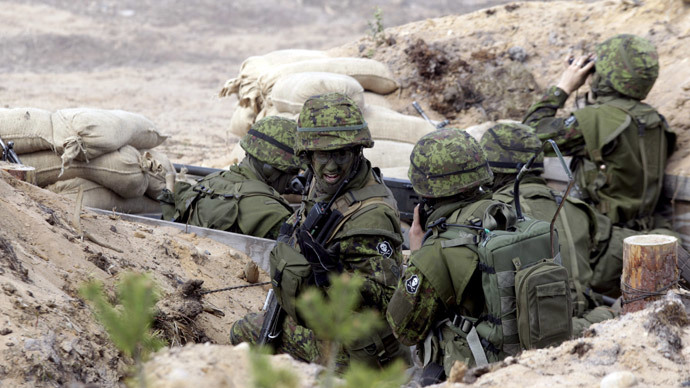NATO keeps pinning blame on Moscow, pushing Kiev to military resolution – Russian envoy

NATO is destabilizing the Ukrainian crisis by turning blind eye to Kiev’s aim for a military solution, Moscow’s envoy to NATO said, warning that alliance’s rhetoric of shifting all responsibility onto Russia is not consistent with real state of affairs.
“NATO continues to position Russia as a participant in the conflict, which is far from reality and has a serious confrontational potential because, in essence, it gives Kiev carte blanche to seek a military solution to the conflict,” Russian envoy to NATO Aleksandr Grushko told Rossiya 24 TV channel.
NATO Secretary General Jens Stoltenberg announced earlier on Wednesday that the alliance will create up to eight new command and control units on its eastern borders.
READ MORE: Cold war games: NATO, friendly air forces brace for large Arctic drills
“We are establishing six command and control units in the three Baltic countries [Latvia, Lithuania, Estonia] and in Poland, Bulgaria, and Romania. And probably also [there will] be two more of those in two more countries,” Stoltenberg said.
Calling the alliance’s belligerent rhetoric towards Moscow an “outdated” tune, Grushko added that NATO’s approach is not consistent with the real state of affairs in Europe. The envoy hinted that NATO’s perceptions of a threat is artificially created with the help of the Baltic countries which beef up an anti-Russian stance with baseless accusations of security threats.
“It seems like some states, for various reasons, including internal political, enjoy being in the front-line, requiring special attention, special protection. And what is most important, [these countries] continue to search for more enemies and to write off their own mistakes whether in foreign policy or internal under the guise of some mythical threat from Russia,” Grushko said.
The exaggeration of the “Russian threat” and the buildup of NATO forces along its borders does not correlate with the real needs of security in the region, Grushko said, calling the situation “completely inadequate to the risks that exist in this region.”
READ MORE: Britain sends biggest warship for NATO drills on Russian border
According to the diplomat, NATO has been boosting its activity in the region that for decades was absolutely safe in terms of “conventional threats.” The alliance is now hosting over 30 jets in the Baltics, while before 2004 the region did not host any NATO air power, Grushko stated, also noting the increase in surveillance flights.
“Russia has increased its air activity by around 50 percent, so that is one of the reasons we have increased air policing on the NATO side,” Stoltenberg explained during a conference at the Center for Strategic International Studies. The NATO chief also stated that the alliance’s “security measures” also include a doubling of NATO Response Forces, and a creation of a spearhead rapid reaction force as well as the increasing the size and frequency of military exercises.
Meanwhile the prospects for NATO’s further expansion to the east are bleak, believes Grushko, despite Kiev’s plans to join the North Atlantic Alliance as mentioned in Ukraine’s new national security strategy. Stoltenberg said eventually it’s up to Ukraine “and 28 allies to decide if NATO's going to enlarge and have a new member” after Ukraine announced it “will implement a reform program and then aim at applying for membership.”
But there are not many “enthusiasts” in NATO who really believe there are prospects for Ukraine to become a member, according to Grushko . This scenario is “virtually impossible” because everyone understands what a dangerous and unpredictable “mine” that would lay under European security, said Grushko.












